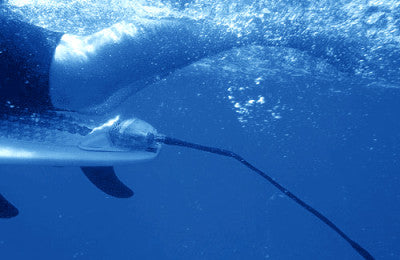
Surfers, kite surfers, swimmers, snorkelers — they’ve all suffered attacks by sharks in Hawaii this year.
Tragically, a 20-year-old German visitor died after being attacked by a shark off Maui earlier this month. Jana Lutteropp was snorkeling at White Rock Beach in Makena, Maui, when the shark attacked, as reported by CNN 22nd Aug 2013
It was the fifth shark attack off the Valley Isle in recent months and in total eight people have been bitten by sharks this year, including four in the past three weeks.
The spate of attacks has left experts puzzled, and groping for answers and local Hawaiian scuba diving and spearfishing businesses struggling. But is there already a proven solution to preventing shark attacks?
Shark Shield, the Australian manufacturer of a patented shark deterrent, believes attacks could have been avoided if its electrical shark deterrent, the Shark Shield FREEDOM7, had been worn.
The company’s electrical shark deterrent is the result of more than 20 years of scientific research by some of the world’s leading experts in sharks including the KwaZulu-Natal Shark Board of South Africa.
The result of these two decades of research and development is the Shark Shield FREEDOM7, the only scientific proven and independently tested electrical shark deterrent designed to reduce the risk of an unwanted shark encounter.
In 2012, scientists from SARDI (South Australian Research Institute) released detailed research where they conducted 116 static bait trials on the Shark Shield FREEDOM7 near the Neptune Islands of South Australia and 189 dynamic trials using seal decoy tows near Seal Island, South Africa.
In the static test, the product significantly increased the time for sharks to take the bait. Once the device was activated, observers noticed a decrease in interactions within two meters. Throughout the seal decoy tow tests, there were no breaches and only two at-surface interactions when the device was turned on. With the device turned off, there were 16 breaches and 27 surface interactions.
Amanda Wilson, Managing Director of Shark Shield, says the deterrent works on the principle that all chondrichthyes — sharks, rays, skates and chimeras — possess ampullary receptors in their heads which are used to find food, communicate and find a mate.
These receptors are tuned to low-frequency fields but they only operate when in close proximity with food — or a diver.
“Strapped to the ankle of a swimmer or diver, the Shark Shield emits an electromagnetic field between two electrodes that disturbs these receptors with what has been described as a lightning fast pain of whale-like proportions,” says Amanda.
Ms Wilson states there are no known long-term adverse effects to the shark from the electrical field but the discomfort is enough for it to deter a shark from approaching a swimmer or diver.
Based in Perth, Western Australia, Shark Shield has developed this technology to the point where the Shark Shield FREEDOM7 is used all over the world by spearfishers, surfers, divers and kayakers in addition to Australian and US Navies and the US Coastguard.
Veteran US swimmer Diana Nyad, this week become the first person to successfully complete a marathon crossing from Cuba to Florida, and as reported on CNN, Diana relied on Shark Shield during her epic swim to protect against possible shark attacks.
Besides protecting swimmers and other ocean-goers from shark attacks, the Shark Shield FREEDOM7 could benefit the ocean sports based businesses in Hawaii, many of which have reportedly been hit hard by the recent spate of shark attacks.
Ken Goetz, owner of rainbowscuba.com boat was quoted on KHON2 news as saying people have been deterred from taking scuba diving course. “We’ve had so many of them cancel. They’re like, ‘We’re afraid of the sharks.’ Been both guys and girls,” Goetz said.
Another scuba company based in East Oahu told KHON2 it had lost $10,000 last week, and also blamed it on the



